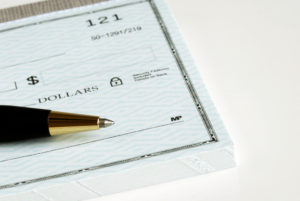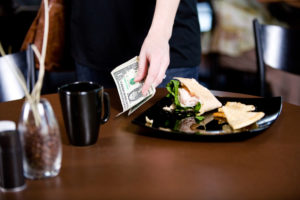1. Learn how to write and cash a check.

JohnKwan / Shutterstock.com
This is especially important if you’re going to be paying rent or not utilizing the online payment options for your utilities. You may need to write a check for any other number of reasons: paying for a camping trip, paying for your cap and gown at graduation, sending a donation in to a charity, or paying back a friend from whom you borrowed money (though there’s always Venmo for that). If your college is in a town that doesn’t have an ATM connected to your bank and you don’t want to pay any ATM fees, you can also write a check to “cash” (instead of a person’s or organization’s name) and exchange it for cash at a bank.
As an example, if I were to write a $52.00 check to my friend Jane Doe, I would date the check on the line next to the word “Date,” write her full name on the line next to the words “Pay to the order of,” and write the numeral amount (52.00) in the box next to the dollar symbol. On the line below, I’d write in words the amount of money I want to give her (fifty two dollars and 00/100) and then draw a line from the end of your words to the end of the line. (This is a safety precaution so someone can’t write in additional amounts; the line is already fully used.) On the line marked “Memo” I’d note what the money was for (e.g., dog walking) and then sign my name on the line in the bottom right.
If someone gives you a check, like for your birthday or repayment, you also need to know how to cash or deposit it. Most banks have a phone app that will allow you to deposit a check without going to a bank, but this may not be allowed if the check is for a large sum of money. To cash a check you will need to go to a bank.
How to deposit a check: Before you use the app to take photos of your check or you bring it to the back, flip the check over. There will be a couple of faint lines and the words “endorse here.” This is where you should sign your name. You can also choose to write the words “for deposit only” followed by your bank account number. This ensures that the money is routed to the correct account. Typically, this money is available for use within 24 hours, but it could be sooner. Do not write below the line that says, “Do not mark below this line.”
How to cash a check: Like when depositing a check, you will need to endorse it with your signature. Do not write “for deposit only” or your account number if you want to exchange the check for actual money. Then bring it to a bank where you have an account (otherwise you may be asked to pay a fee) and show the teller your photo ID. They’ll be able to verify your identity and your account and provide you with cash in exchange for the check.
2. Know how to use a credit card.
Using a credit card is pretty simple: you’re given a limit and under no circumstances should you exceed it. In fact, for the best credit score, keeping the percentage of what you use each month (out of your credit limit) beneath 30% is ideal. Therefore, if your credit limit is $7,500, you should spend no more than $2,250 each month. It’s also important to pay off your balance in full each month; if you carry a balance over from month to month, you’ll start accruing interest, and credit card interest rates range anywhere from 10% to over 20%. You don’t want to have to pay extra just for the convenience of having a credit card.
One way to avoid this is to budget and only put a certain amount of money on your card each month, money that you know you have available in your checking or savings account to put toward the card. If your credit card use is more variable, just check frequently to make sure that what you’re putting on the card doesn’t exceed your ability to pay. This is how people go into debt, and it’s very hard to recover your credit score after failing to pay. You can set up automatic payments so that your card is paid in full each month.
It can sound scary, but college really is the perfect time to start building your credit score. Having a good score will help you rent apartments, buy cars, and get loans later on. Instead of paying for everything in cash, use your credit card and then pay if off in full; you’ll probably earn points and you’re jump starting your financial profile for the future. As long as you’re responsible with your money, you’ll be fine. For more tips on how to use a credit card wisely, check out this blog post.
3. Learn how to tip properly.
You’ll encounter this most often when you’re eating out at a restaurant, where it’s standard to tip between 15–20% on the pre-tax cost of the bill. There is no reason to tip on the full amount including tax because tax is not included in the price of the goods and services that you received. This money goes to the local, state, and federal government and doesn’t stay within the restaurant. If your subtotal was $65.00, but your total is $72.00, tip on the $65.00. This amounts to $9.75 (15%), $11.70 (18%), or $13.00 (20%). Add the tip amount to the total amount of the bill to get your total price. You can download various tip calculators for your phone if you don’t want to do the math the old-fashioned way.

Sean Locke Photography / Shutterstock.com
If you have exceptionally good or bad service, you can shift this percentage up or down, but try not to tip under 10%, even if you’re angry. At many restaurants the tip might not go directly to the person who is waiting your table. Servers often split their tips with the host or hostess, the dishwasher, and the people who clear your table, so even if your server was terrible, you could be penalizing others for something they didn’t do. (If your service really is that awful, I encourage you to reach out to a manager.)
Your servers aren’t the only ones who should be tipped, though. Don’t forget your hairdresser or manicurist (15–20%), taxi driver (15%), food delivery person (a couple of dollars or 10%), masseuse (15%), and bartender ($1.00 per drink). If you stay in a hotel and a doorman helps you with your bags, give him or her a couple of dollars for the service. Leaving a tip for the maid service is also customary; a few dollars for each night of your stay. If you travel abroad, be sure to look up the local tipping customs before you go; they can be different from those in the United States.
-
How to Do Laundry: Tips to Master Everyone’s Least Favorite Chore
-
Life Skills that Will Help You Both at School and in Your Career
-
Easy Ways to Save Money and Lengthen the Life of Your Car
-
Why You Should Start Building Credit in College
-
Packing for a Cold Climate: What to Wear and Where to Shop
-
What You Need to Know about Buying Your First Car
-
Dealing with Bedbugs in College
-
The Relationship between Credit Card Debt and Credit Card Literacy
-
Executive Functioning Skills: Organization and Time Management
-
The Ultimate Car Emergency Kit for Students
-
Packing for a Warm Climate: What to Wear and Where to Shop
-
Introducing Executive Functioning Skills

